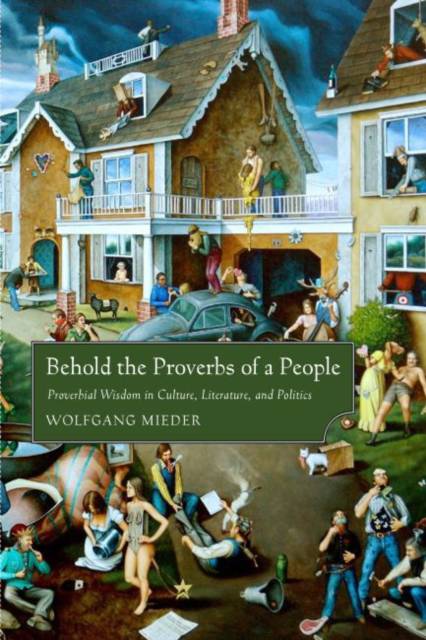
Bedankt voor het vertrouwen het afgelopen jaar! Om jou te bedanken bieden we GRATIS verzending (in België) aan op alles gedurende de hele maand januari.
- Afhalen na 1 uur in een winkel met voorraad
- In januari gratis thuislevering in België
- Ruim aanbod met 7 miljoen producten
Bedankt voor het vertrouwen het afgelopen jaar! Om jou te bedanken bieden we GRATIS verzending (in België) aan op alles gedurende de hele maand januari.
- Afhalen na 1 uur in een winkel met voorraad
- In januari gratis thuislevering in België
- Ruim aanbod met 7 miljoen producten
Zoeken
Behold the Proverbs of a People
Proverbial Wisdom in Culture, Literature, and Politics
Wolfgang Mieder
Hardcover | Engels
€ 186,95
+ 373 punten
Uitvoering
Omschrijving
The thirteen chapters of this book comprise an intriguing and informative entry into the world of proverb scholarship, illustrating that proverbs have always been and continue to be wisdom's international currency. The first section of the book focuses on the field of paremiology (proverb studies) in general, the spread of Anglo-American proverbs in Europe, and the phenomenon of modern proverbs. The second section analyzes the use of proverbs in the world of politics, including a chapter on President Obama, while the third concentrates on the uses of proverbs in literature. The final section ends with detailed cultural studies of the origin, history, dissemination, use, function, and meaning of specific proverbs. Noted scholar Wolfgang Mieder shows that proverbs matter in culture, literature, and politics. Proverbs remain part and parcel of oral and written communication, and, he demonstrates, they deserve to be studied from a range of viewpoints. While various chapters deal with a variety of issues and approaches, they cohere through a rhetorical perspective that looks at the text, texture, and context of proverbs as speech acts that make a noteworthy impact on culture and society. Whether proverbs appear in everyday speech, on the radio, on television, in films, on the pages of newspapers or magazines, in advertisements, in literary works, or in political speeches, they serve as formulaic verbal devices to add authoritative weight through tradition, convention, and wisdom.
Specificaties
Betrokkenen
- Auteur(s):
- Uitgeverij:
Inhoud
- Aantal bladzijden:
- 480
- Taal:
- Engels
Eigenschappen
- Productcode (EAN):
- 9781628461404
- Verschijningsdatum:
- 1/11/2014
- Uitvoering:
- Hardcover
- Formaat:
- Genaaid
- Afmetingen:
- 152 mm x 229 mm
- Gewicht:
- 898 g

Alleen bij Standaard Boekhandel
+ 373 punten op je klantenkaart van Standaard Boekhandel
Beoordelingen
We publiceren alleen reviews die voldoen aan de voorwaarden voor reviews. Bekijk onze voorwaarden voor reviews.









